How Supporters are Reacting to Public Fundraising during Lockdown
02/06/2020
On the 23rd March 2020 the UK went into lockdown due to the Covid-19 pandemic, dramatically affecting the lives of individuals and the operations of businesses and organisations, including charities and fundraising agencies.
Many fundraising channels had to stop immediately including mass participation events, retail, street, door to door and private site activities. However with telephone fundraisers and support staff working from home, contact with the public has continued throughout this period.
In this document I look at how existing and prospective charity supporters have been responding to receiving calls from charities and campaigning groups. I will present both statistical analysis and just as importantly collated anecdotal feedback about individuals’ responsiveness, feelings, and thoughts towards contact from charities and requests for help.
Ancedotal Feedback
Based on our activity, which encompasses tens of thousands of points of contact, there is absolutely no doubt that the general public’s attitude has changed over time. Very few supporters at any stage reacted with displeasure at being contacted or being asked for donations, nor expressed opinions that such an endeavour was inappropriate or illogical. However, personal and financial insecurity, doubt and fear was tangibly present in early conversations. Such understandable anxiety has noticeably reduced over time, with pragmatism, faith, hope and positivity ever more evident as each day passed.
To help inform our charity partners of the responsiveness and thoughts of supporters we collated a weekly overview, excerpts of which are presented below.
Week 1
The impact on our fundraising performance is minimal. Those who do donate are happy in the knowledge that they are still able to help the causes that they care about, and irrespective of the fundraising outcome, having genuine conversations and building rapport during this time is important. In fact, it seems that many prospects take comfort in knowing that the world is still turning! What we have found, is that objections relating to Covid-19 seem to have taken over from the objections that we are used to. Conclusively, people are giving for different reasons and people are not giving for different reasons, however we feel that most of these outcomes would have been the same prior to the current climate.
Week 3
We are happy to say that the impact on our general success is still minimal. As before, a lot of our usual objections have become related to temporary financial issues based around the lockdown but despite this, our results across the board remain healthy. The majority of people are happy to speak, despite a few but unfortunate examples whereby a supporter may be ill with the virus or is grieving a loved one, although this is infrequent. As a whole, there has been a lot of positivity from our supporters which is incredibly encouraging. Even those who are not able/comfortable to give at the moment due to financial uncertainty are still in good spirits about the whole situation and they appear to appreciate calls, which reiterates the importance of keeping in touch with supporters now more than ever.
Week 5
From a supporter perspective, calls are still welcomed and the majority of people are keen to help out. People are inspired and appear to benefit from a sense of empowerment due to the fact that they are able to make a difference during a time where many feel powerless- a testament to your kind-hearted supporters and our fundraisers alike.
Week 7
As expected, our callers are still coming into contact with those affected by the lock down, furloughing and job loss. Outside of the general lockdown, there has been a slight increase in those who are being directly or indirectly impacted by Covid-19. However, these people are extremely understanding of the reasons for our calls, and the current climate is also proving to be a great motivator for the people who can help, to do what they can for the causes that they care about.
Week 9
Across the board, our campaigns are still performing well and with no issues. Our callers are mentioning Covid-19 related topics much less frequently and have reported that hearing people say things like “we seem to be past the peak” or “lockdown is easing off now/soon” is increasingly common. This seems to reflect growing optimism from the members of the public that we are contacting which is encouraging. Relative to this, a number of our callers have mentioned that they are getting fewer vague, covid-19 related comments e.g. “these are uncertain times”, indicating that although there are still a lot of people who are furloughed and a number who have unfortunately lost their jobs, many people are seemingly clearer on where they stand financially.
Results Over Time
Our thorough feedback shows that the public have been happy to receive calls from charities and to discuss the impact of Covid-19 on the organisation, their objectives, and beneficiaries. The statistical evidence also reflects this receptiveness. The graphs below represent 10 weeks prior to lockdown and 10 weeks post lockdown, shown in grey.
Facebook Lead Gen Conversion
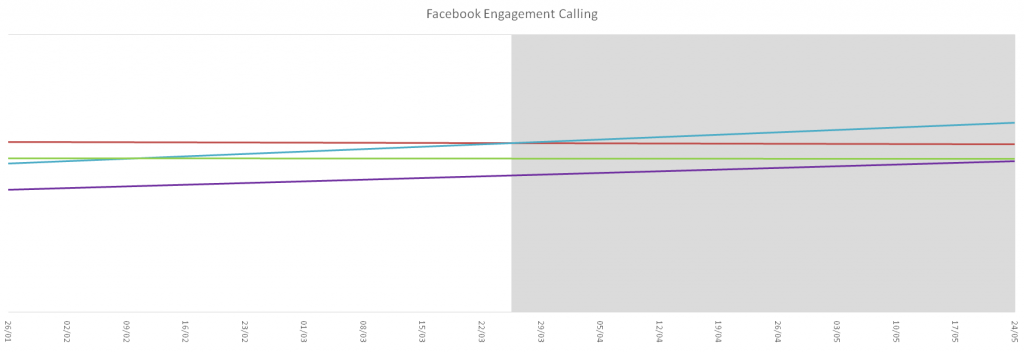

With these campaigns, the increased conversion is evident at the lead generation stage as we are seeing an increased volume of data and lower cost per lead. The likelihood of conversion stays the same, but the value has increased and we are able to contact a higher percentage of the file
Upgrade
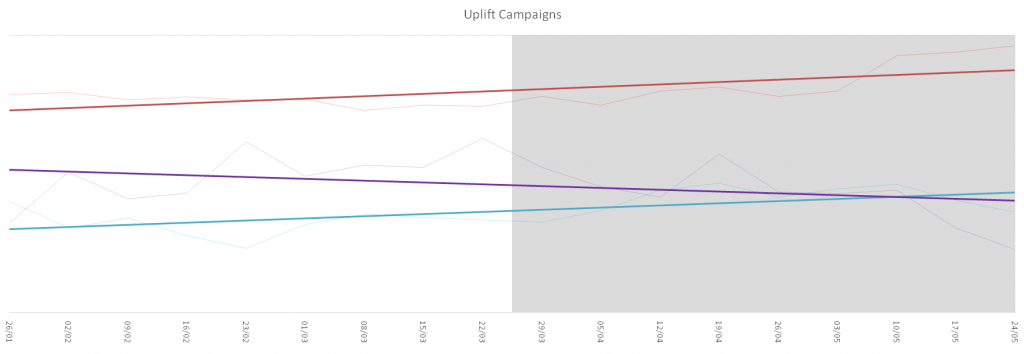

When speaking to existing supporters we can see a significant increase in conversion and value. Amended call guides ensure that we address the issues that the organisation is facing, engage with people with tact and sensitivity, and enable committed supporters to give further support.
Lapsed
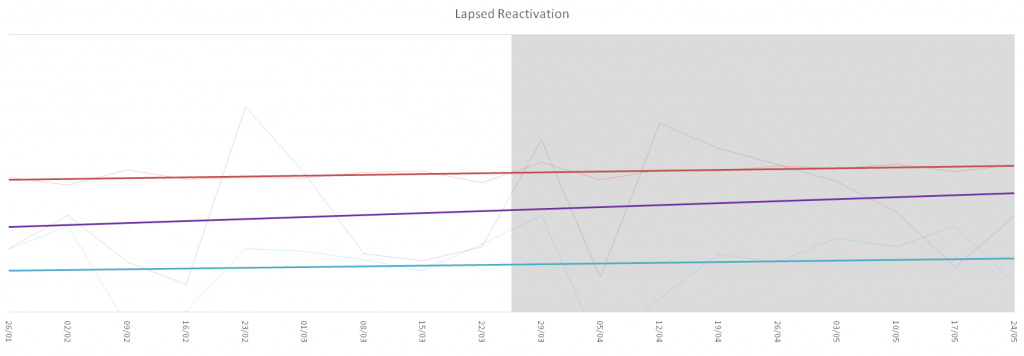

This evidence shows that supporters who were asked to reinstate their gift during lockdown, agreed to do so at a higher rate than we saw in campaigns conducted before the crisis, demonstrating the public’s positive reaction to the charity sector and the causes they support. In addition, these supporters who can historically be difficult to contact are more likely to pick up the phone now and contact rate is increasing as a result.
Acquisition


Acquisition remains consistent throughout this period, with a small increase in conversion. The public are still happy to engage with charities and start a regular gift when inspired to do so. The case for support for all campaigns references the current situation and the long term impact that the crisis will have on the beneficiaries.
Summary
These are unprecedented times and no-one knew what the impact would be or how the public would react. I hope this document shows that the Great British public remain as committed to good causes as ever. A one-to-one conversation continues to provide value and benefit to both charities and supporters and can be used to inspire new donors or connect with existing ones.
Further Information
If you require further information about how the public has been responding to fundraising telephone calls and charitable requests for help during the lockdown period please do not hesitate to contact me.
- Natalie Bailey
- Director
- nbailey@nttfundraising.co.uk
- 07968 638345
A conversation can win hearts… but also crucial insight
First published by UK Fundraising, 01 Aug 2019
When did you last have a really great, meaningful conversation via email or text? We use them to chat and to exchange snippets of humour and ideas all the time. But, our best conversations? They’re the ones when we can really express ourselves – the phone calls and the catch-ups over coffee.
As professional fundraisers we know there’s only so much we can say in written form and different channels will
have their own place in a charity’s overall
strategy. We know how powerful a photograph can be when we allow an
image to speak a thousand words for our cause, but the spoken word plays a hugely
important role in our everyday
lives and relationships, carrying and enhancing emotions. For a charity, it can deepen our understanding of
supporters, nurture
those relationships and engender passion, loyalty and support.
While we can’t always meet up with supporters for a chat, we can pick up the phone to them (providing we stick to a
few simple rules), and the value of that
conversation can be immense for both sides.
Knowledge is power
The impact for a charity of talking one-to-one with supporters cannot be overstated. While what you say to them is
of course important, the real value
comes from the bit you can’t script. And that is what the supporter says to
you.
Importantly, in a two-way call the supporter gets the chance to ask questions about the charity’s work, how their
money is used and how else they can help.
And through this part of the conversation, you can gain an
understanding of their priorities and concerns, whether they feel valued and what they feel they gain
from
supporting you.
Talking with supporters can help to ascertain if your charity has got its communications and fundraising strategies
right by uncovering what they would
like to hear about and ways they would prefer to support you. It can help to
identify if someone might be vulnerable. All hugely important insight that you
can act upon positively, and that
you can’t easily get elsewhere.
Through listening to what they are saying, there’s also an opportunity to tailor that conversation to the individual, building a deeper connection. This might give you an opportunity to mention a relevant project or event, or to introduce different ways of giving or taking action. A genuine conversation can make all the difference.
“…I was so inspired by the conversation that I’ve just applied to volunteer. I just wanted to say how eye-opening that conversation was and how glad I am he rang.”
Charity supporter
Building deeper relationships
A good conversation that flows naturally can engage and foster positive feelings towards your organisation. When an
existing supporter receives a call, more
often than not they appreciate the opportunity to give their viewpoint.
It can help them feel a part of something good, to understand more about the charity’s
work and the people
at the other end of the phone. This personal connection is so important in helping the supporter feel involved,
needed and valued.
“I had a great conversation with an amazing woman. She hated getting a call for more money, so I asked for a quick chat and an update. As the conversation developed, we chatted about how amazing animals are and that I am from West Africa. She loved hearing how I grew up in a village and said she had never had a charity conversation like that before. So, she decided to increase her donation even though I didn’t ask her to again.”
Telephone fundraiser
On a more practical level, the speed of reaction from a conversation is also greatly beneficial. In just one day,
you can establish how well your script is
working and change it to increase its effectiveness. As calls are
recorded, you can always listen back and this is particularly important if there is a query about
whether
someone might be vulnerable for example.
Getting it right
To ensure both sides benefit from a call, there are a few points to consider.
First, is there actually anything two-way about the dialogue you’re planning on having? If it’s just to share a
simple update, other mediums may be more
appropriate. Work out then what you want to know from supporters and
how you can use that insight. For example, you might be unsure as to whether people
really read and like your
newsletter. Asking them could provide information you can use to change what you do.
Making sure you include lots of open questions in your call guide will ensure you give people a real opportunity to
share their opinions. Feeding back is also
important – if supporters know their opinions are making a
difference, they will feel more valued and engaged.
This exchange of views and information means that everyone gains. For charities, what is learned can be invaluable
insight for future development, while
for the supporter, it shows them they matter and increases their feelings
of warmth for your charity and its work. And let’s face it – there’s nothing more
likely to leave us smiling
than a good chat!
6 tips for a successful telephone campaign
First published by The Fundraiser 01 July 2019
A one-to-one conversation with a supporter or potential supporter is uniquely powerful. For fundraising, engagement and on-going stewardship, you can’t beat talking with someone…
As a result, the telephone can play an invaluable role in bringing charities and their supporters closer together. In fact, having spent over 30 years speaking with charity supporters and helping a wide range of charities of all sizes and causes, we have found communicating by telephone provides more added value than virtually any other channel and produces some of the best returns on investment. What’s more, thanks to improved practices and data management, the latest complaints report from the Fundraising Regulator shows that the telephone is also one of the least complained about fundraising channels.
Telephone then is an important part of any integrated fundraising mix. Here are our 6 top tips to help you make the most from your telephone campaigns.
1. Consider supporters across the organisation
The telephone can be used in many ways, not only fundraising. Over the years, we have run successful telephone campaigns across many different charities for teams in individual giving, lottery, legacy, community and events and even supporter care. When developing a strategy for integrating the phone consider communications across the whole organisation. Working with a major hospital charity, we helped them successfully grow their income by using the phone to recruit between 5,000 and 10,000 new regular givers each year as well as to build stronger relationships with existing donors.
2. Know your agency
If you use an agency, make sure you invest time in getting to know them and their work. Having worked with this particular charity since 2010 many of our campaigns are collaborative in nature, from initial ideas to finalised creative concepts. We encourage regular visits to our offices to give them the opportunity to get to know everyone who will be involved in a campaign, conduct their own training sessions and gain insight into technical processes. Our fundraisers have also visited the hospital, and their trustees and senior managers have also visited our offices and listened to calls made on their behalf.
3. Have a clear objective
To make the calls as successful as possible, each campaign needs its own distinct objectives. The charity uses the telephone to recruit new supporters every year and with them we agree Key Performance Indicators that are monitored daily and reviewed quarterly. We also use the phone to welcome new supporters which requires an entirely different set of objectives. There are multiple types of calls so be clear on what you are looking to achieve and how exactly it can be monitored, measured and evaluated.
4. Be prepared to adapt and test
One of the joys of the telephone is the fact that results are instantaneous, which means changes can be made and implemented at a moment’s notice. These can be anything from the ask structure to the case for support. When looking at introducing medical research messaging for example, we worked with the charity to test the concept using the phone, with their standard proposition as a benchmark. We have also tested varying ask structures and the impact of this on immediate conversion as well as long term giving. For instance, we know that £5 a month has low attrition, but we found that those that offered to donate this amount are less likely to cancel than those where we had asked for £5 a month. Thus we were able to build a ranged ask structure that is designed to encourage people to offer an amount they are comfortable with.
5. Get added value above pure ROI
When setting up the campaign, consider what value you could gain aside from financial, and how to obtain and measure this value:
- Listen to supporters – not just from the perspective of monitoring the callers, but a huge amount can be gained from what your supporters say too.
- Renew consent – use calls as an opportunity to renew and collect updated consent preferences.
- Identify potentially vulnerable individuals – a telephone conversation is virtually the only way to identify vulnerability within your existing donor base and determine whether future communications should change or cease.
6. Consider the telephone as part of a wider strategy
A telephone conversation is immensely valuable, but the impact can be improved further by combining it with other channels, such as email, SMS and direct mail. For instance, if someone has responded to a Facebook advert, we see an increase in results in the follow up conversion calling of between 2-10% if they have had email correspondence beforehand.
Many have seen considerable success from using the telephone to communicate with supporters across the organisation. Now is a great time to assess this channel and see how your organisation could use it for one-to-one conversations that add value for both you and your supporters.
A new era for NTT
04/04/2019
On the 27th March 2019, Committed 2 Communications Ltd, trading as telephone fundraising agency NTT Fundraising, entered into Voluntary Administration via director appointment following professional advice. In order to be able to continue to serve its 25 charity clients and save all 98 jobs, the agency’s directors have created a restructured agency model that is fit to serve today’s fundraising market and will purchase the viable assets of the company from the administrator.
A sale agreement for the company’s assets was arranged with the administrators SFP Restructuring Ltd. NTT Fundraising’s directors, Dave Clark and Natalie Bailey, secured funding and purchased assets that include staff contracts and the NTT Fundraising brand.
ALL staff have been offered roles in the new company that will trade as NTT, dropping the word ‘fundraising’ to reflect its new and broader service offering. All clients and suppliers have been informed and will transfer to the new company, where they wish to do so; responses have been positive and supportive. No charities will be owed any money and live charity campaigns will continue uninterrupted.
Dave Clark, director of NTT, says: “I joined the fundraising profession in 2003. By 2005 I was completely hooked on a sector so full of vibrancy and passion that even after the difficult climate of the last few years, I still very much believe in what we do. We have been able to partner with a funder who shares our belief in the power of this sector and so with their help we’ve been able to secure the future of NTT and the huge pool of talent that it holds.”
It has been well documented that in 2015 the world of fundraising changed with significant impact on telephone fundraising, and subsequently many agencies have closed. NTT Fundraising saw a major drop in the volume of traditional telephone fundraising campaigns but has seen stability in other areas including events campaigns, and also considerable positive growth in supporter stewardship. This has been reflected in the Institute of Fundraising’s recent telephone fundraising survey in which 85% of charity respondents said they use the phone for welcome calls and relationship building/stewardship, excluding specific financial asks.
While the new agency will retain much of the brand’s character, heritage and experience built over three decades of supporting charities via the telephone, its new business model will offer a more robust and diverse range of marketing, fundraising and communications services. It aims to provide more strategic campaigns for charity clients who want to focus on supporter engagement across integrated channels with multiple approaches in creating tailored supporter journeys. While telephone will be a core service (both outbound and inbound), it will sit alongside SMS, email, white mail, digital production, social media and strategic fundraising consultancy.
Looking to the future for telephone fundraising, Natalie Bailey, director at NTT, adds:
“The future for charity telephone communications is looking bright, we recognise that telephone fundraising will always have its place within the world of charities. Campaigns are becoming increasingly more complex and we plan to continue to develop services for charities with more sophisticated and insightful use of the telephone, combined and integrated with other channels and touch points to engage more deeply with supporters and positively build on their relationships. We are excited about the future and believe that NTT now has a positive outlook as a result of this restructure.”
Notes to Editors
For further information or interviews with NTT, please contact: Jenny Turner – jenny@turnerpr.co.uk or 01932 859 617 / 07940 472 653
About NTT Fundraising
Since 1988 NTT Fundraising has been a brand name that is synonymous with telephone fundraising. The first telemarketing call was made on 17th March 1988 to an ActionAid supporter asking them to become a Child Sponsor and the success of these early calls created ActionAid’s National Telephone Team (NTT ) and telephone fundraising was born.
Since 2008 the NTT Fundraising brand has been owned by Committed 2 Communications Ltd. But throughout its 31 year history, with various owners, locations and branding, NTT Fundraising has been at the forefront of using the telephone for fundraising purposes. NTT Fundraising has raised many millions of pounds for charities, between £10m and £15m per year, as well as 25,000 new regular givers each year. A prestigious client list included Great Ormond Street Hospital Charity, Dogs Trust, WWF UK, Macmillan Cancer Support and Dementia Revolution.
New IoF Guidance supports new era for telephone fundraising
13/02/2019
We all know that the fundraising sector has had a tough time over the last few years, and as one of the frontline channels, telephone has often been at the eye of the storm. But things are on the up and we’re now firmly in a new era of fundraising – one that’s better regulated, has a greater focus on supporters, and that is full of potential. And with this comes a growing recognition of the valuable role the telephone can play in building and enhancing relationships with donors and supporters through genuine conversations.
To add to the renewed vigour we’re seeing in this field, this week the Institute of Fundraising (IoF) has published a new guide for its members, A Good Call: using the telephone for successful fundraising sharing its support for the telephone as a key channel within a healthy fundraising mix. The guide highlights both how telephone can be beneficial in your supporter communications and fundraising, as well as how to use it correctly within the new regulatory environment.
There have been considerable changes within the telephone fundraising world, and unsurprisingly there is still confusion over just how the channel can be used: whether it can, for example, be used for donor acquisition, which data can be used, what makes a compliant call, and not least how best to converse with members of the public. And yet telephone’s fundamental benefit has never changed, it enables conversation. Real conversations where charities can speak with and listen to their supporters: where they can ask opinions and answer questions, raise awareness, support events – and, of course, fundraise. All of which helps to build stronger supporter relationships, improving retention and loyalty.
It’s encouraging then to see the world of telephone fundraising starting to grow and thrive once more. In fact, research by the IoF released alongside its guide shows that three quarters of charities are currently using the telephone as part of their fundraising strategies: 85% of those for welcome calls, relationship building and stewardship. It’s a shift the guide encourages and supports, in not only assuring charities that it is good practice to get back on the phone but critically, telling them how to do so too.
We are proud to have fed into the IoF’s guide, just as we are proud to support our clients with our experience in delivering quality campaigns that bring great results and stronger, more mutually beneficial supporter relationships.
It’s a channel we know has much to give within a modern integrated fundraising mix.
It’s time to pick up the phone.
Natalie Bailey
Client Services Director, NTT
It’s Time to Talk – How are you?
06/02/2019
Many of us will answer ‘fine’, even when we’re not. Too often, mental health problems are treated as a taboo subject – something not to be talked about, especially at work.
At NTT Fundraising we know just how powerful a conversation can be, so we’re proud to be supporting tomorrow’s Time to Talk Day (7th Feb) – the annual day for the Time to Change campaign that encourages everyone to talk about mental health and end discrimination.
Mental health affects us all and we should feel able to talk about it. With one in four people affected, it’s an issue that’s important to us and the wellbeing of our staff. We’re firm believers that a conversation, whether it’s face to face or over the phone, can be a positive and helpful experience.
We also know that while fundraising is a rewarding job, it can be challenging at times, so we’ll be encouraging all our staff to take part tomorrow too, to acknowledge the need to talk, to explore how mental health issues can affect us, and to know they can ask for support.
If you’d also like to participate, there are lots of great resources on the Time to Talk Day site, including tips to help you start a conversation and guides for planning activities to get more people involved. You can also take part online with the hashtag #TimetoTalk.
It doesn’t matter how you do it, the important thing is to try and get those conversations going – so collectively we can change how we think and act about mental health for the better.
Thanks!
31/01/2019

With public perceptions changing, it’s a new era for the phone.
25/01/2019
As a charity telephone communications agency we have to be aware of public opinion, and speaking to up to 1 million people a year gives us a good grasp of how the public respond to receiving telephone calls. While the phone has suffered in the past from negative perceptions fuelled in part by media reporting, the good news is, views are changing and as a result, the outlook for this channel is looking very positive.
In fact, two significant articles have been published recently that provide enlightening evidence of this shift.
Firstly, In January the latest Fundraising Preference Service (FPS) figures were released by the Fundraising Regulator.
The figures show that between November 2017 and October 2018, a total of 3,847 people made requests to charities to be removed from communications. This is a significant drop from the previous year when 5,700 went online to make a suppression request. And it’s reassuring to see that, despite a publicity campaign by the FR and significant media coverage, the figures are nowhere near as high as we first feared they might be, when some studies and articles were initially anticipating figures of up to 30 million people. (https://www.decisionmarketing.co.uk/news/up-to-30-million-could-sign-up-for-charity-opt-out)
When we look at the figures in more detail it is also interesting to note that rather than hoards of people suppressing specific channels, the vast majority are suppressing all communications. And, when a specific channel is selected it is most commonly direct mail, with just 5% selecting telephone alone.
The second article, published on decisionmarketing.co.uk, informed us that the DMA were stopping the TPS Protect mobile app due to low customer uptake. According to the piece, “ the app was originally designed to help consumers avoid unwanted calls, register their mobile number with the Telephone Preference Service and quickly register complaints about nuisance or scam calls”.
But consumers are simply not using it and the service is now being discontinued.
So what does all this mean? For me, it seems that the public are not as anti-telephone as we were led to believe. Don’t get me wrong, I know that there are other significant factors that influence these figures. It could be argued that the Telephone Preference Service is more credible now – the fact that it is 12% smaller than this time last year with the removal of 2.7m records suggests registration is more purposeful. We also have the new consent regulations brought in by GDPR, which are having an impact on how phone data is used, and technology within mobile phones can also play a part. In addition, public trust in charities is increasing and the Great British public are renowned for being a kind and generous lot, who more often than not want to support good causes and truly make a difference to the world around them.
A new era of faith and positivity seems to be dawning. As more charities see just how the telephone can help them engage with supporters, more are coming back to it, and receiving a positive response. As a result, the outlook both for charity fundraising and long-term stewardship looks good. So, is it time for you to pick up the phone?
Natalie Bailey
Client Services Director, NTT
Thanking Supporters at Christmas
08/11/2018 (First published by UK Fundraising on 26/10/18)

Why ‘thank you’ might be the most important thing you could say to supporters this Christmas
As is the case for so many fundraisers, we are well in the thick of Christmas campaign planning. We’re thinking long and hard about the importance of taking a donor-centric approach, without shying away from the all-important ask.
But – now and again – that’s what we do – we strip out the ask altogether. We simply call to say thank you and it’s incredible how powerful those calls can be.
This got me thinking: should we – as a sector – be doing things differently this Christmas? Traditionally a time for giving, what if charities were to use the festive period to give back to supporters, thanking them for all they have done?
The power of saying thank you
Last year’s recommendations from the Commission on the Donor Experience highlights the immense potential for charities to use the phone to thank supporters. And we couldn’t agree more. We’ve found that a sincere and heartfelt thank you call, tailored to that individual, can have a tremendous impact, particularly when it comes to nurturing supporter relationships.
When charity communications are so often a request for help, making a personal call to say ‘thanks’ is a unique opportunity to let supporters know just how valued they are.
No fundraising ask. No ask of any kind. Just a genuine thank you.
You might say it on behalf of your CEO, from everyone at your organisation, or on behalf of your beneficiaries.
Essentially, it’s an opportunity to put your supporters first; to remind them that so much of the vital work you undertake could not happen without them and how much they have enabled the charity to achieve.
Nothing beats the human touch. A call gives you the opportunity to connect with the person at the other end of the phone. Think about what can you do to make them feel truly valued, so that this call will really make their day, how it can be positive and memorable. Will you make them smile? Will the call change the way they see your charity? What will they tell their friends and family about the experience?
The impact of a thank you call
In one thank you campaign that we delivered for a client over the Christmas period, we spoke to 8,500 supporters to say a massive thank you and, where relevant, asked supporters to confirm their future contact preferences.
Above all, we wanted to deepen supporter relationships and make sure they felt truly treasured. But the results of the campaign and insight it offered were far greater and more wide-ranging than many might have expected.
Arguably the most obvious but no less important finding was that supporters were genuinely surprised and happy to receive the call. People often assume that supporters don’t want to be called, but the feedback received was hugely positive, and, importantly, there were no complaints at all.
Most supporters wanted to hear from the charity again and we secured a new email consent rate of 35%. This meant the charity could better understand not only how supporters wanted to hear from them in the future, but now had a range of options to continue building those relationships.
Deepening understanding of your supporter base
The impact of a great call is further reaching than just the feel-good factor of the call itself. Ultimately, these conversations enable us to build our knowledge and understanding of supporters.
During this particular campaign, we identified 55 vulnerable donors, which enabled the charity to adapt the way it communicates with those people accordingly and to offer them added support. Three legacy pledgers also identified themselves during the calls, helping the charity to see how connected those individuals feel to the cause and how best to communicate with them in the future.
Of course, I had no sooner put pen to paper to write this blog when up popped this great piece from Richard Turner about Solar Aid’s Thanks A Million campaign, sharing how well a simple thank you call worked for them.
So, what if we could collectively turn Christmas on its head and make it less about the ask and more about voicing a genuine, well-delivered thank you to supporters across the country?
Supporter engagement and public trust has never been more important. Now is the time to reassess the power of a simple thank you.
NTT Fundraising is launching a year-long research project measuring the effect of thank you calls on supporter engagement and charitable giving. Charities interested in participating are encouraged to get in touch at nbailey@nttfundraising.co.uk
NTT’s 30th Birthday
16/03/2018
On Thursday 17th March 1988 the first call was made from NTT and we have been changing the world ever since. Over the last 30 years, we have spoken to over 16 million people and have raised approximately £200 million for our 160 charity partners.
We would like to thank all of our wonderful charity partners and fundraisers for helping NTT to be the best telephone fundraising agency there is!
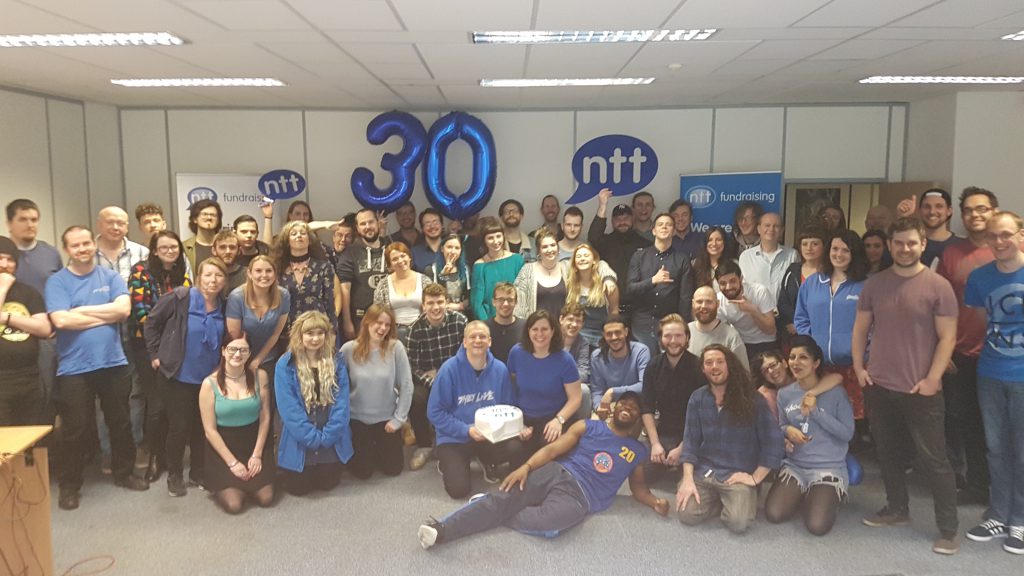
World’s Biggest Coffee Morning for Macmillan Cancer Support
29/09/2017
NTT held its annual World’s Biggest Coffee Morning for Macmillan Cancer Support. Lots of lovely cakes along with savoury items were sold in the break room and a ‘guess the height of the cake’ competition took place.
We contributed to the fantastic £27 million pounds raised by Coffee Mornings across the country. The money will be used to support people living with cancer along with their friends and family, throughout their cancer journey.
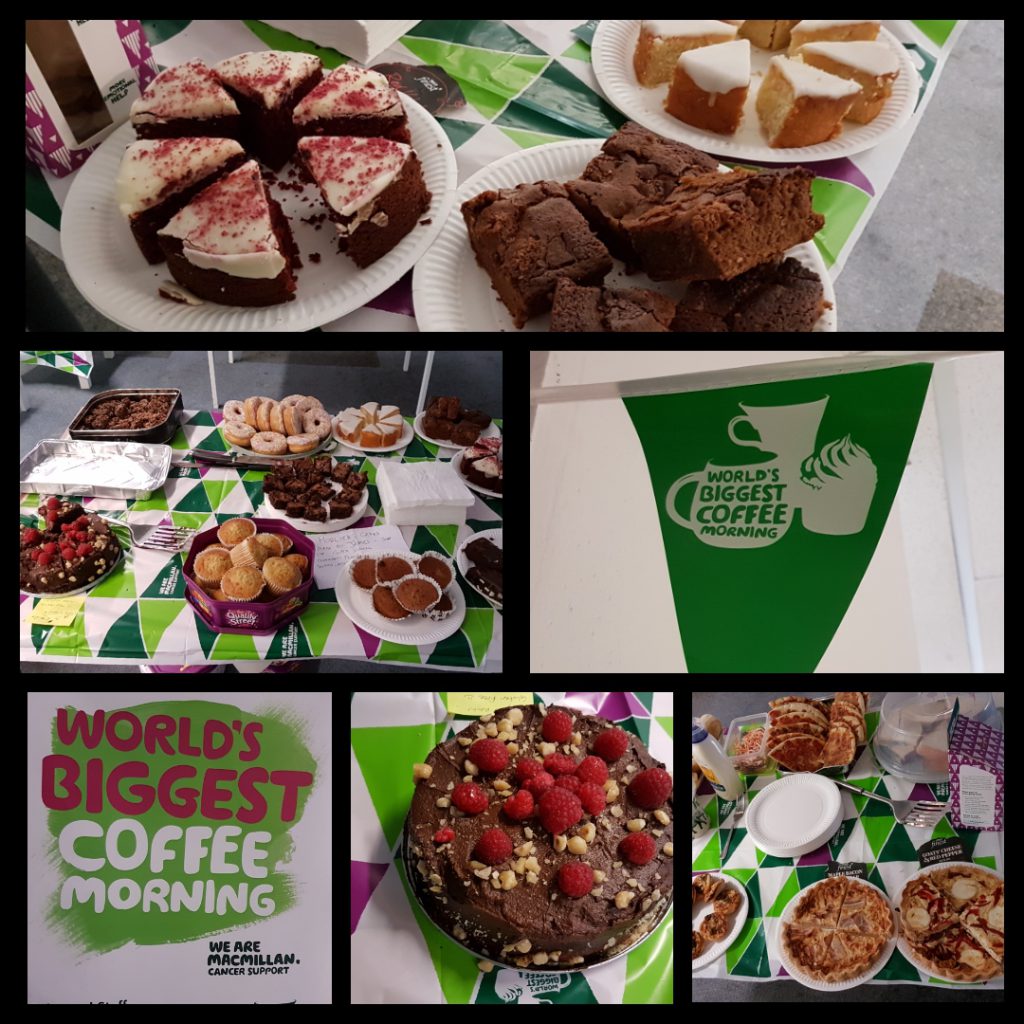
First in Charity Sector to become TPS Assured
01/03/2016
The upheaval in the fundraising and charity sector has brought many pressing issues to the fore, not least of which is how vital it is for charitable organisations and agencies to manage their communications in order that they ensure they respect the wishes of donors and potential donors.
NTT Fundraising has joined a select group of organisations in becoming TPS Assured. No other organisation within the sector, whether charity or agency has successfully passed this Institute of Fundraising endorsed audit. We are proud to represent the charity sector as the gold standard in telemarketing excellence and hope that we are playing our part in sending a strong message to the public that fundraising organisations are taking criticism and accusations seriously.
TPS Assured certification indicates that the business not only complies with all the rules governing telemarketing but also respects the wishes of donors and potential donors by following best practice. At NTT we have undergone forensic analysis of our databases and systems to ensure that the way in which we handle charity data is compliant with all current legislation.
As well as becoming TPS Assured, we have also become full members of the DMA after successfully completing the compliance audit. In 2013 we became certified in ISO 9001 (Quality Management) and ISO 27001 (Information Security Management) which was undoubtedly an important step to becoming TPS Assured. We have always been confident in our robust compliance regime but having this now validated by the TPS themselves will give the public assurance in our approach.
Trustees now have greater responsibilities when it comes to fundraising and the TPS Assured certificate gives them the reassurances that they need. Gaining this certificate this is vital to improve the public perception of charities. The trustees and fundraising managers of our charity partners can demonstrate due diligence and work with us in confidence. More importantly, their supporters can then have confidence in the charity too.
For more information about TPS Assured and what the certification means, please contact us on info@nttfundraising.co.uk
Natalie Bailey
Dave Clark


